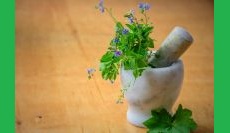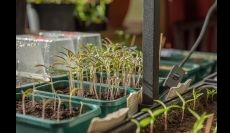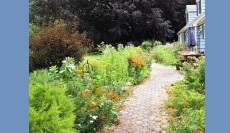|
Empty
Welcome
Visitor
Browse Courses
Sort by:
Default

2026/02
The scientific names for plants intimidate many gardeners. When we use common names, we run the risk of purchasing the wrong plant or misidentifying plant problems. In this class we will review the history of plant names in the Western world, why they change and why we as gardeners should make an effort to use these names. It’s not all Greek or Latin, and we do not worry too much if we don’t pronounce it perfectly. Having this knowledge can expand your gardening expertise.
More
 Starts:
2/17/2026
6:00 PM
Starts:
2/17/2026
6:00 PM
 Ends:
2/17/2026
8:00 PM
Ends:
2/17/2026
8:00 PM
 Duration:
2 hours
Duration:
2 hours
 Credits:
2 Class Hours
Credits:
2 Class Hours
 Pricing:
Pricing:
 Location:
Location:
 Status:
53 open seats left
Status:
53 open seats left

2026/01
Great-grandmother was wiser than we thought! She was self-reliant, knew how to make use of what was around her and so can you! Find out how versatile herbs and produce can be. Gain new respect for the lowly onion, over-ripe banana, stinky garlic, burning hot cayenne peppers, and more.
Explore nature’s pharmacy with Master Herbalist Andrea Candee, instructor for the NY Botanical Garden, and author of Gentle Healing for Baby and Child: A Parent’s Guide (Simon & Schuster).
Learn how to enhance the body’s natural defenses, improve energy levels and prevent onset of colds and flu. Discover natural approaches to headaches, candida, arthritis, constipation, eczema, coughs, allergies, and much more. Easy to use preparations such as encapsulated herbs, botanical extracts, poultices and herbal teas are discussed in this most informative presentation. Make the health food store a user-friendly alternative to the pharmacy. Bring your questions!
More
 Starts:
2/25/2026
7:00 PM
Starts:
2/25/2026
7:00 PM
 Ends:
2/25/2026
8:30 PM
Ends:
2/25/2026
8:30 PM
 Duration:
1 hour
30 minutes
Duration:
1 hour
30 minutes
 Credits:
2 Class Hours
Credits:
2 Class Hours
 Pricing:
Pricing:
 Location:
Location:
 Status:
72 open seats left
Status:
72 open seats left

2026/07
Plants can be identified in the winter! It is more difficult than when plants have leaves and flowers but it is possible. We'll meet at the Middlesex County Extension Center, walk around the grounds, then walk down to the train tracks (CT Valley Railroad State Park) for additional plant id opportunities. Please dress for the outdoors and wear sturdy shoes and appropriate clothing. Bring a walking stick, if desired.
More
 Starts:
3/5/2026
10:00 AM
Starts:
3/5/2026
10:00 AM
 Ends:
3/5/2026
12:00 PM
Ends:
3/5/2026
12:00 PM
 Duration:
2 hours
Duration:
2 hours
 Credits:
2 Class Hours
Credits:
2 Class Hours
 Pricing:
Pricing:
 Location:
Location:
 Status:
9 open seats left
Status:
9 open seats left

2026/03
Join Windham County coordinator John Lorusso for online seed starting class. We will explore methods for growing vegetables and flowers from seed. We will discuss schedules, materials, and infrastructure necessary for success with seedlings. We will also cover different strategies for propagating plants. Bring your knowledge and experience as well, we want to hear what has worked for you. Hopefully you will come away with the confidence to try growing some of your plants from seeds and cuttings allowing you a larger garden for more flowers and vegetables and more weeding!
More
 Starts:
3/8/2026
1:00 PM
Starts:
3/8/2026
1:00 PM
 Ends:
3/8/2026
3:00 PM
Ends:
3/8/2026
3:00 PM
 Duration:
2 hours
Duration:
2 hours
 Credits:
2 Class Hours
Credits:
2 Class Hours
 Pricing:
Pricing:
 Location:
Location:
 Status:
79 open seats left
Status:
79 open seats left

2026/09
This class explores the five-century history of botanic gardens as centers of education, conservation, art, and tourism, from their origins in 16th-century Europe to their global prominence today. Drawing on more than 30 years of travel and research, Dr. Richard Benfield guides participants through over 80 iconic gardens across six continents, examining how botanic gardens evolved from teaching collections into major cultural, economic, and wellness destinations. The class highlights the extraordinary diversity of the world’s great gardens, explains why garden visiting has become one of the most popular forms of tourism, and reveals what makes these places so enduringly valuable, beautiful, and relevant for Master Gardeners and garden enthusiasts alike.
More
 Starts:
3/11/2026
7:00 PM
Starts:
3/11/2026
7:00 PM
 Ends:
3/11/2026
8:30 PM
Ends:
3/11/2026
8:30 PM
 Duration:
1 hour
30 minutes
Duration:
1 hour
30 minutes
 Credits:
2 Class Hours
Credits:
2 Class Hours
 Pricing:
Pricing:
 Location:
Location:
 Status:
93 open seats left
Status:
93 open seats left

2026/04
Microgreens are a delicious and beautiful crop you can grow year round. Join John Lorusso Windham Master Gardener Coordinator for a lecture and demo on microgreens. Topics include light requirements, growing mediums, growing containers, varieties, seeds and seeding density, how-to grow and harvest. We’ll also cover nutrient density and recipe ideas. The workshop includes planting your own tray of microgreens to take home ($10 fee).
More
 Starts:
3/15/2026
1:00 PM
Starts:
3/15/2026
1:00 PM
 Ends:
3/15/2026
4:00 PM
Ends:
3/15/2026
4:00 PM
 Duration:
3 hours
Duration:
3 hours
 Credits:
2 Class Hours
Credits:
2 Class Hours
 Pricing:
Pricing:
 Location:
Location:
 Status:
8 open seats left
Status:
8 open seats left

2026/08
Soils are a complex ecosystem with a diverse community of organisms. These organisms are vital to the cycle of all life on earth. Come explore the soil food web and learn about its components, functions and how you can encourage these essential lifeforms.
More
 Starts:
3/25/2026
1:30 PM
Starts:
3/25/2026
1:30 PM
 Ends:
3/25/2026
3:30 PM
Ends:
3/25/2026
3:30 PM
 Duration:
2 hours
Duration:
2 hours
 Credits:
2 Class Hours
Credits:
2 Class Hours
 Pricing:
Pricing:
 Location:
Location:
 Status:
95 open seats left
Status:
95 open seats left

2026/05
It is tempting to think of a foundation garden as simple decoration around the base of a building. Yet the garden areas at our doorsteps and outside our windows have surprising potential for greater benefits. This seminar offers a fresh approach that incorporates native plants for wildlife, protects dark skies, and increases our sense of safety and well-being. Come away with a variety of recommendations for updated designs that work in today's environment.
More
 Starts:
9/17/2026
10:00 AM
Starts:
9/17/2026
10:00 AM
 Ends:
9/17/2026
12:00 PM
Ends:
9/17/2026
12:00 PM
 Duration:
2 hours
Duration:
2 hours
 Credits:
2 Class Hours
Credits:
2 Class Hours
 Pricing:
Pricing:
 Location:
Location:
 Status:
93 open seats left
Status:
93 open seats left
|

